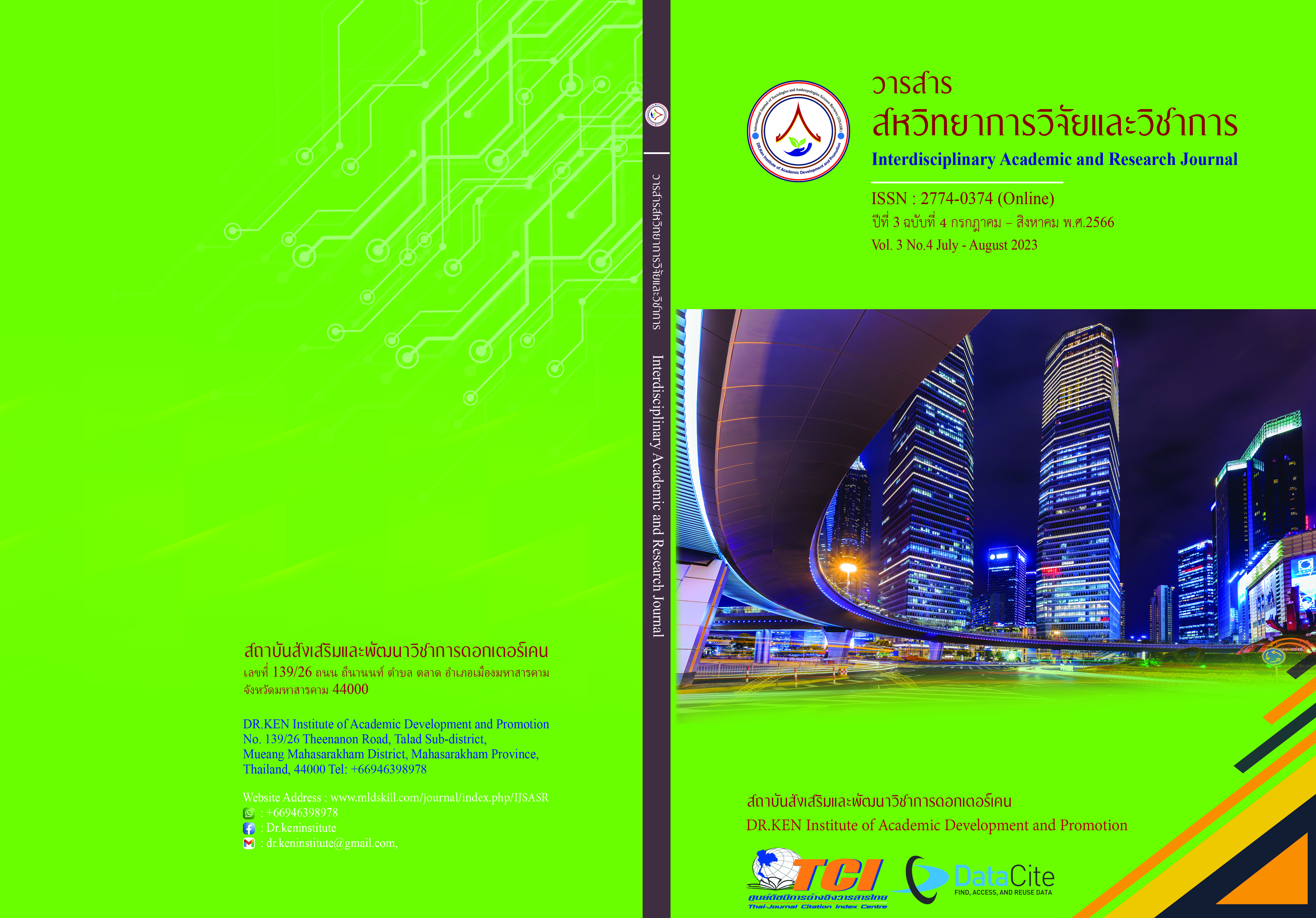Development of the Hybrid Training Model by Using Active Learning Methods for Enhancing Specific Competencies of Psychiatric Social Workers
DOI:
https://doi.org/10.14456/iarj.2023.230Keywords:
Hybrid Training Model; , Active Learning; , Psychiatric Social Worker, Specific Competencies in Psychiatric Social WorkAbstract
Active learning process is a student-centered learning management process, emphasizing the role and participation of the learners, by allowing learners to learn and perform activities on their own, which teachers give advice, encourage or facilitate learners to learn through analytical thinking processes, synthesizing learning exchanges between learners and presenting information. The objectives are 1) To develop the hybrid training model by using active learning methods for enhancing specific competencies of psychiatric social workers and 2) To study results by using the hybrid training model by using active learning methods for enhancing specific competencies of psychiatric social workers. Methods: Phase 1 Developing and examining the hybrid training model by using active learning methods for enhancing specific competencies of psychiatric social workers Phase 2 Evaluating the hybrid training model by using active learning methods for enhancing specific competencies of psychiatric social workers. The sample group was 38 social workers who applied the training model willingly. The research tools 1) The hybrid training model by using active learning methods for enhancing specific competencies of psychiatric social workers 2) The specific competencies of psychiatric social work evaluation form 3) The question guidelines to run the focus group for the training model evaluation 4) The evaluation forms for post-training practices of the samples. The data analysis Quantitative data analysis using percentages means, and standard deviations. Qualitative data analysis using content analysis. Results: (A) The hybrid training model using active learning methods consists of (1) Principles (2) Objectives (3) Structures and contents (4) Lesson Plan (5) Learning media (6) Evaluation. The training model runs accordingly through 60–hr, 6 – online modules and 30-hr,1- onsite modules. The hybrid training model and quality content are suitable for all components. which has an index of conformity (IOC) equal to 1.00. (B) Specific competencies evaluation of the sample group shows that mean of pre-training evaluation results of all 3 aspects of the competencies (a. realizing the value, ethics, and standard of psychiatric social work practices; b. Psychiatric social working abilities; c. abilities to develop state of the arts of psychiatric social work) are significantly higher (p < 0.05) than that of post-training ones. And (C) The post-training practices of the sample evaluation show that the training model is suitable, and able to reach many targets such as good working practice attitudes; enhancing knowledge, specific skills, and experiences, ensuring that are applicable for daily practices and improvement networks of psychiatric social workers also.
References
กองยุทธศาสตร์และแผนงาน กรมสุขภาพจิต. (2564). แผนปฏิบัติราชการระยะ 5 ปี พ.ศ.2566 – 2570 ของกรมสุขภาพจิต. Retrieved December 25, 2022, from: https://dmh.go.th/intranet/p2554/download/view.asp?id=2349
จตุรงค์ บุญยรัตนสุนทร, ระพีพรรณ คำหอม, เยาวเรศ คํามะนาด, ทองศิริ ก่ำแดง. (2564). การสร้างคุณค่าและสมรรถนะหลักนักสังคมสงเคราะห์วิชาชีพ. วารสารสังคมสงเคราะห์ศาสตร์, 29(1), 294-328.
เจิดจันทร์ พลดงนอก. (2556). การพัฒนาระบบการฝึกอบรมออนไลน์แบบสอนงานสำหรับเจ้าหน้าที่ผู้ให้บริการผู้ใช้เทคโนโลยี ธนาคารพาณิชย์. Veridian E-Journal SU, 6 (1), 385-398.
ชลศิลป์ ตรีสงค์, แจ่มจันทร์ ศรีอรุณรัศมี และขวัญหญิง ศรีประเสริฐภาพ. (2561). การนำเสนอรูปแบบการฝึกอบรมเชิงรุกแบบผสมผสานเพื่อส่งเสริมความสามารถในการแก้ปัญหาของพนักงานขายและบริการด้านโทรคมนาคม. Veridian E-Journal Silpakorn University, 11 (2), 1640-1656.
ทัศนีย์ ธราพร, อารัมภ์ เอี่ยมละออ, และเบญจวรรณ รุ่งเรืองศุภรัตน์. (2563). การเรียนรู้แบบผสมผสาน (Blended Learning) กับอนาคตการจัดการศึกษาสำหรับสังคมในแบบฐานวิถีชีวิตใหม่. วารสารศิลปะศาสตร์ มทร. ธัญบุรี. 1(2), 13-20.
ปณิตา วรรณพิรุณ. (2555). การพัฒนารูปแบบการเรียนแบบผสมผสานโดยใช้เครื่องมือทางปัญญาเพื่อพัฒนาทักษะการคิดอย่างมีวิจารณญาณ. วารสารวิทยบริการ, 23 (2), 153-164.
เพ็ญประภา ภัทรานุกรม. (2565). การพัฒนาสมรรถนะผู้เรียนและกลยุทธ์การสอนในหลักสูตรวิชาชีพสังคมสงเคราะห์ศาสตร์.วารสารสังคมสงเคราะห์ศาสตร์. 30 (2), 145-168.
เยาวเรศ ภักดีจิตร. (2557). Active Learning กับการพัฒนาผู้เรียนในศตวรรษที่ 21. นครสวรรค์: สาขาวิชา สังคมศึกษา คณะครุศาสตร์ มหาวิทยาลัยราชภัฏนครสวรรค์.
วารินท์พร ฟันเฟื่องฟู. (2562). การจัดการเรียนรู้ Active Learning ให้สำเร็จ. วารสารวไลยอลงกรณ์ปริทัศน์ (มนุษยศาสตร์และสังคมศาสตร์). 9 (1), 135-145.
ศิวาพัชญ์ บำรุงเศรษฐพงษ์, ภูริสร์ ฐานปัญญา และเกรียงไกร สัจจะหฤทัย.(2563). การเรียนการสอนแบบไฮบริด (Hybrid Learning) กับการพัฒนาคุณภาพการศึกษาไทยในศตวรรษที่ 21.วารสารนาคบุตรปริทรรศน์ มหาวิทยาลัยราชภัฏนครศรีธรรมราช. 12(3), 213-224.
สนธยา หลักทอง และเผชิญ กิจระการ. (2564). การพัฒนารูปแบบการฝึกอบรมแบบผสมผสานตามหลักการนาตนเองเพื่อเสริมสร้างสมรรถนะการรู้ดิจิทัล สำหรับครูในสังกัดสานักงานคณะกรรมการการศึกษาขั้นพื้นฐาน.วารสารมนุษยศาสตร์และสังคมศาสตร์ มหาวิทยาลัยนครพนม. 11 (2), 197-209.
สมัครสมร ภักดีเทวา และเอกนฤน บางท่าไม้. (2564). การเรียนรู้ยุคใหม่กับการเรียนการสอน ออนไลน์ใน สถาบันอุดมศึกษา. วารสารสุโขทัยธรรมาธิราช, 34(1), 1-18.
อัญชลี ศิลาเกษ และสมนึก อนันตวรวงศ์. (2564). มาตรฐานการปฏิบัติงาน สำหรับนักสังคมสงเคราะห์จิตเวช (ฉบับปรับปรุง ครั้งที่ 1). สมาคมนักสังคมสงเคราะห์. กรมสุขภาพจิต
Eiraldi, R., McCurdy, B. L., Khanna, M. S., Goldstein, J., Comly, R., Francisco, J., Rutherford, L. E., Wilson, T., Henson, K., Farmer, T., & Abbas F. J. (2022). Development and evaluation of a remote training strategy for the implementation of mental health evidence-based practices in rural schools: Pilot study protocol. Pilot and Feasibility Studies, 8, 128. https://doi.org/10.1186/s40814-022-01082-4
Dziuban, C., Graham, C.R., Moskal, P.D. & et al. (2018). Blended learning: the new normal and emerging technologies. Int J Educ Technol High Educ 15 (3), https://doi.org/10.1186/s41239-017-0087-5
Fanter, A. (2010). The Future of Instructional Models. Retrieved January 10, 2023, from: https://www.worldwidelearn.com/articles/hybrid-education/
Downloads
Published
How to Cite
Issue
Section
License
Copyright (c) 2023 Chidchanok Opaswattana, Sankamon Gornnum, Phopthorn Wuttiharn

This work is licensed under a Creative Commons Attribution-NonCommercial-NoDerivatives 4.0 International License.
Copyright on any article in the Interdisciplinary Academic and Research Journal is retained by the author(s) under the under the Creative Commons Attribution-NonCommercial-NoDerivatives 4.0 International License. Permission to use text, content, images, etc. of publication. Any user to read, download, copy, distribute, print, search, or link to the full texts of articles, crawl them for indexing, pass them as data to software, or use them for any other lawful purpose. But do not use it for commercial use or with the intent to benefit any business.
















.png)


